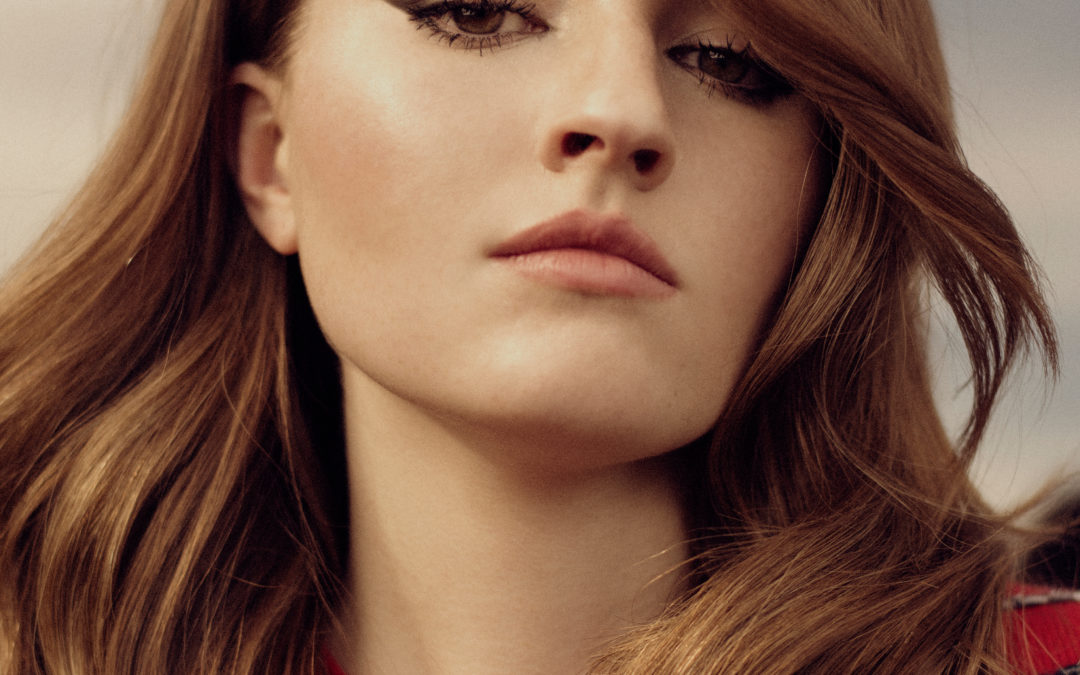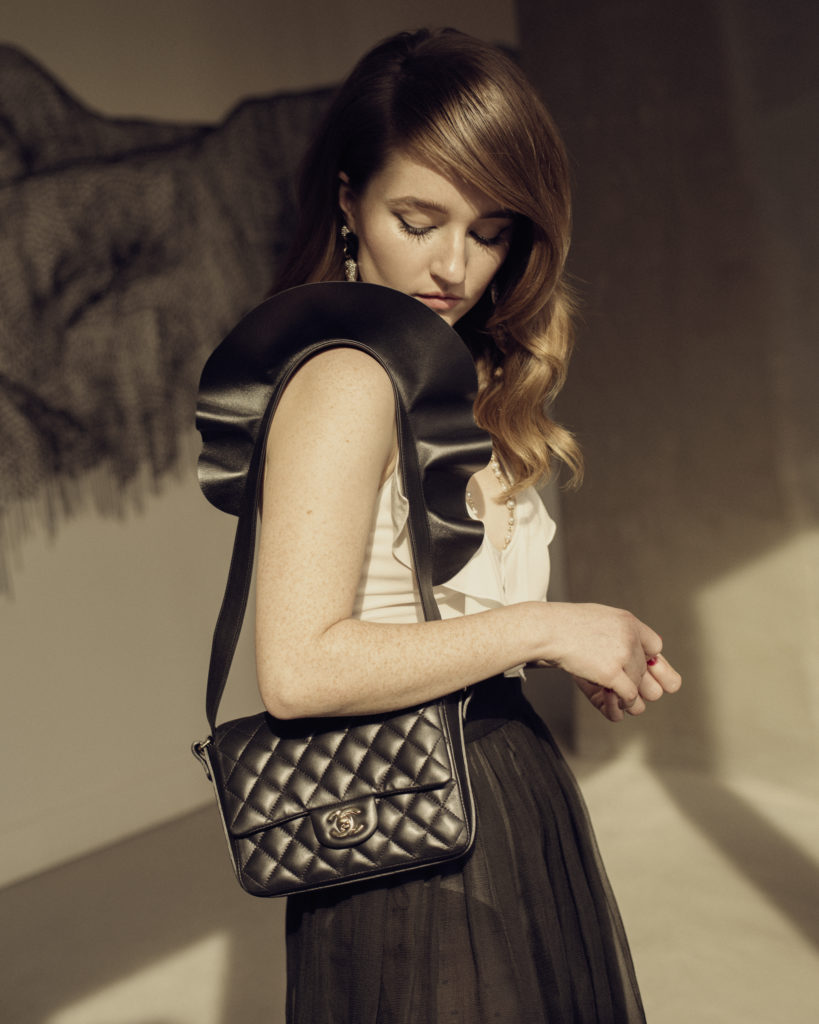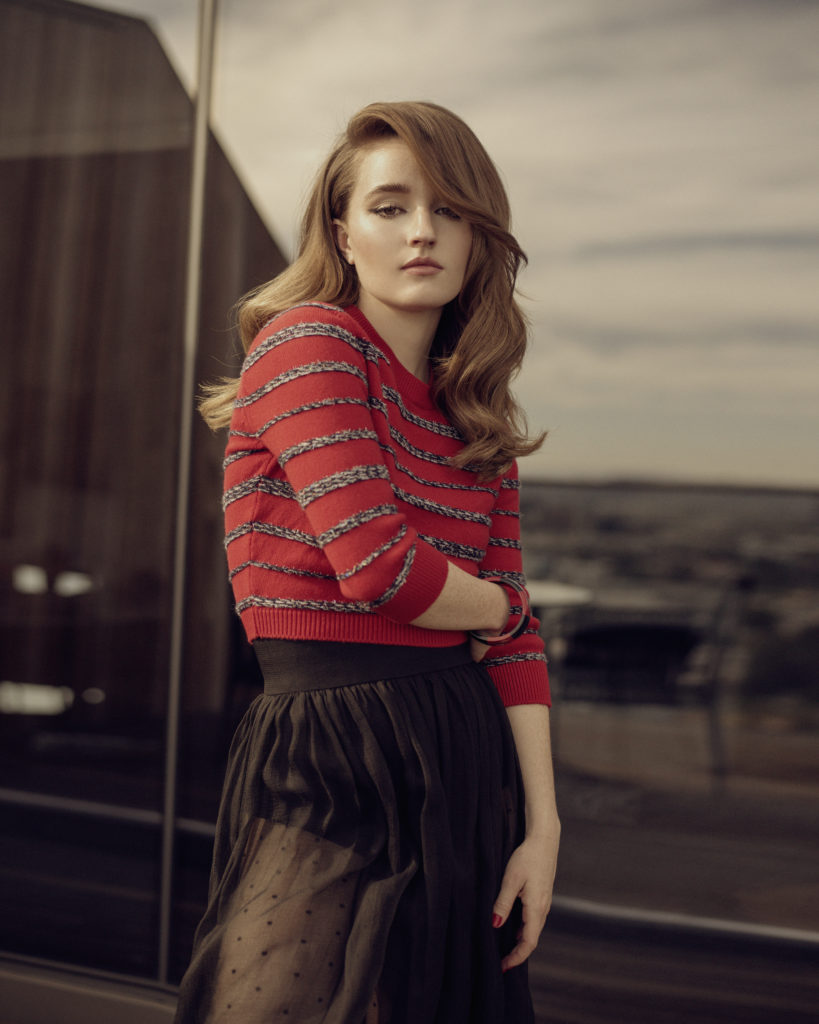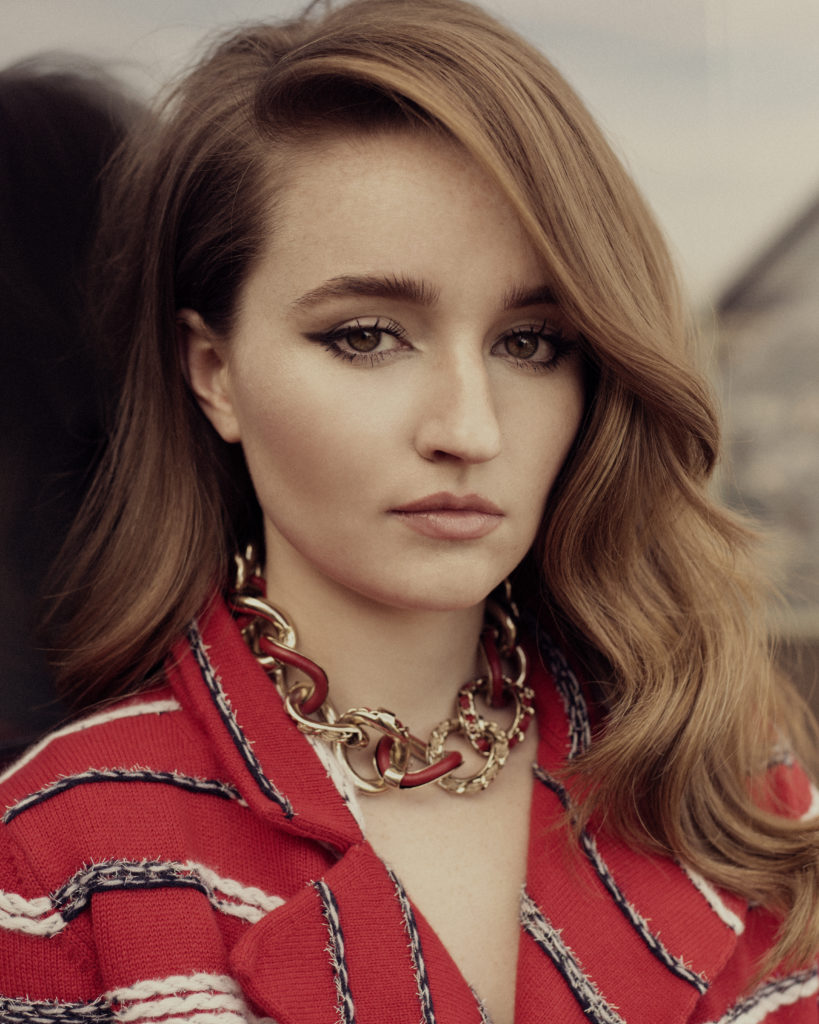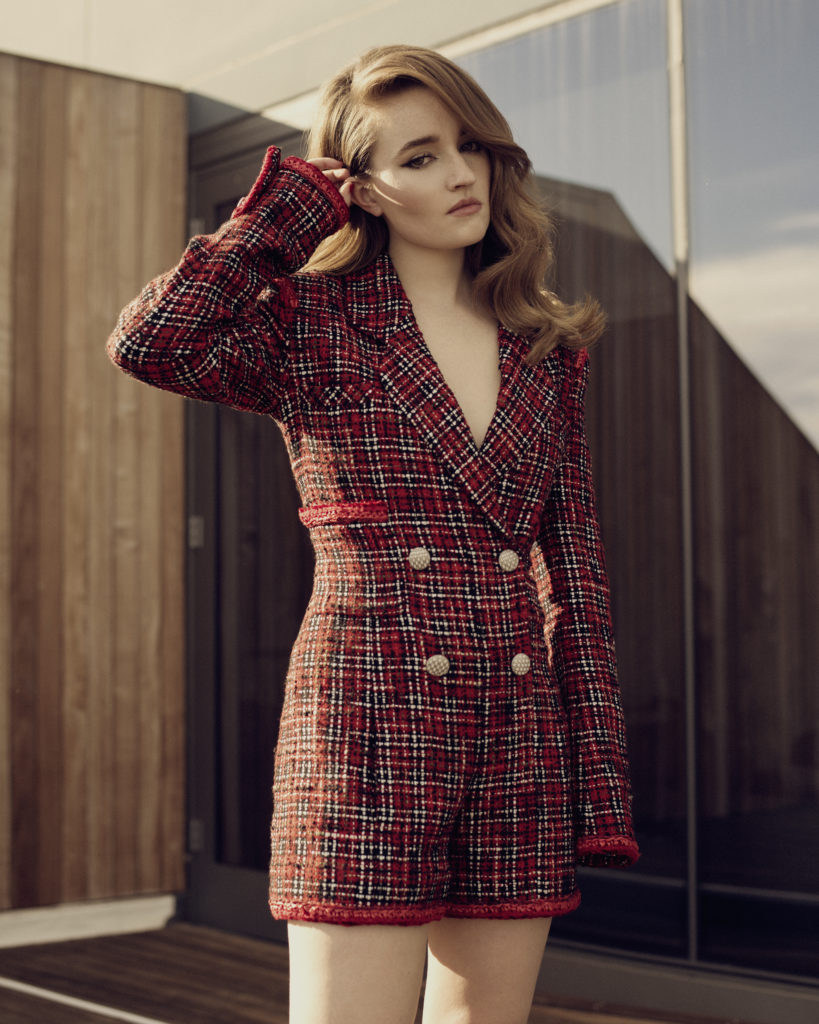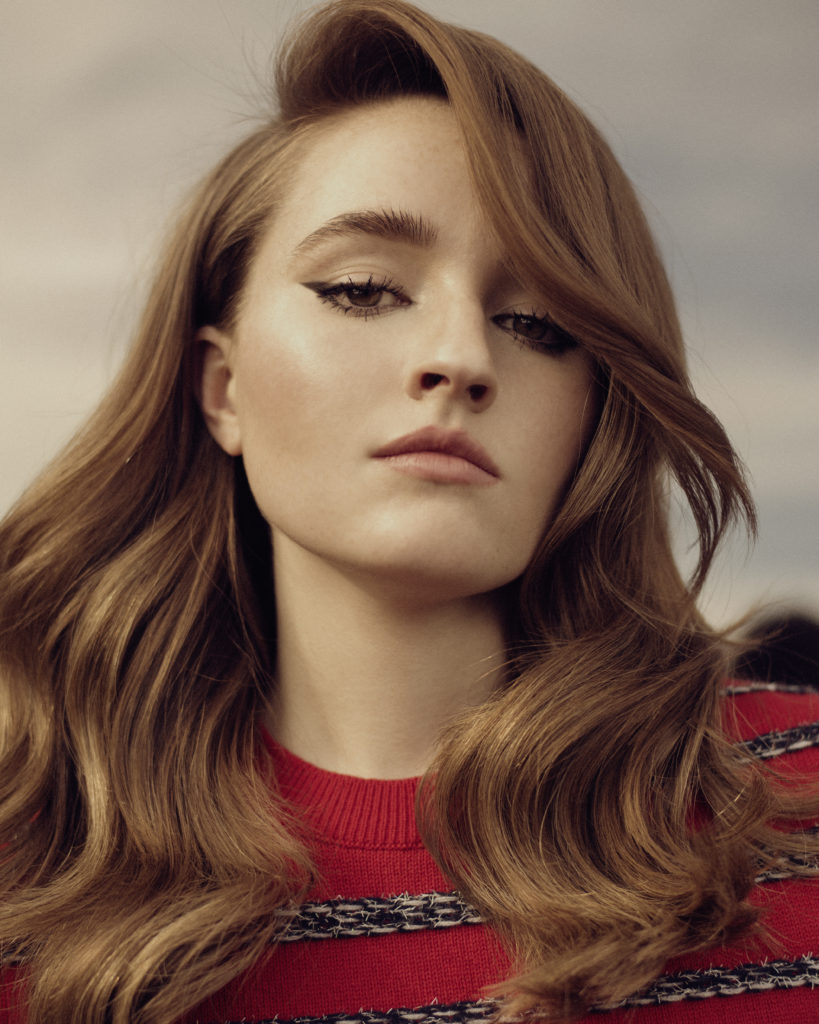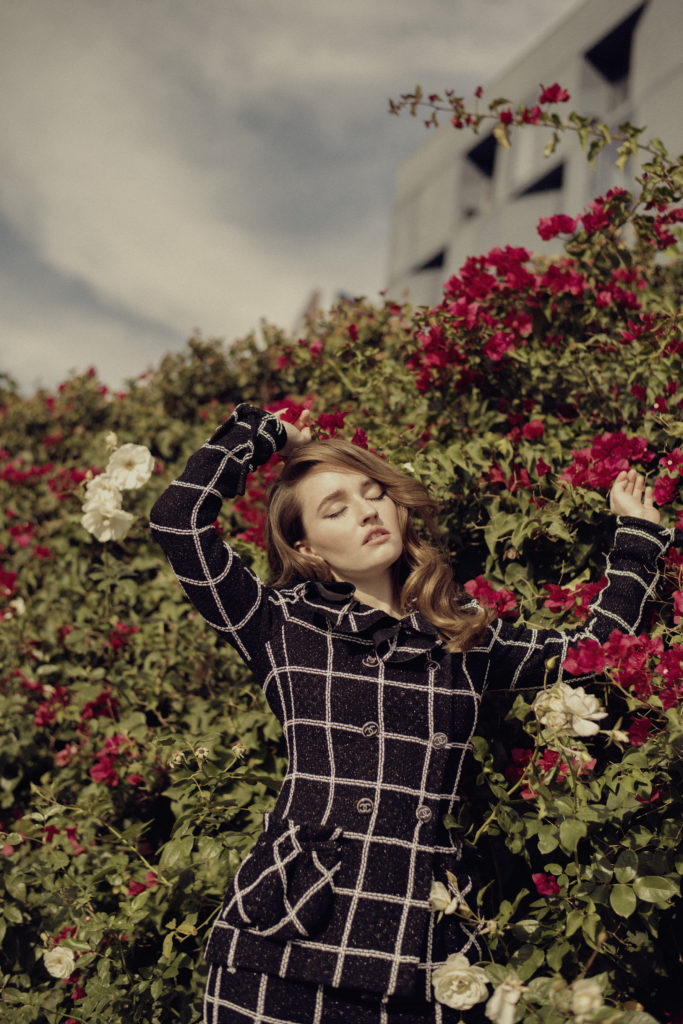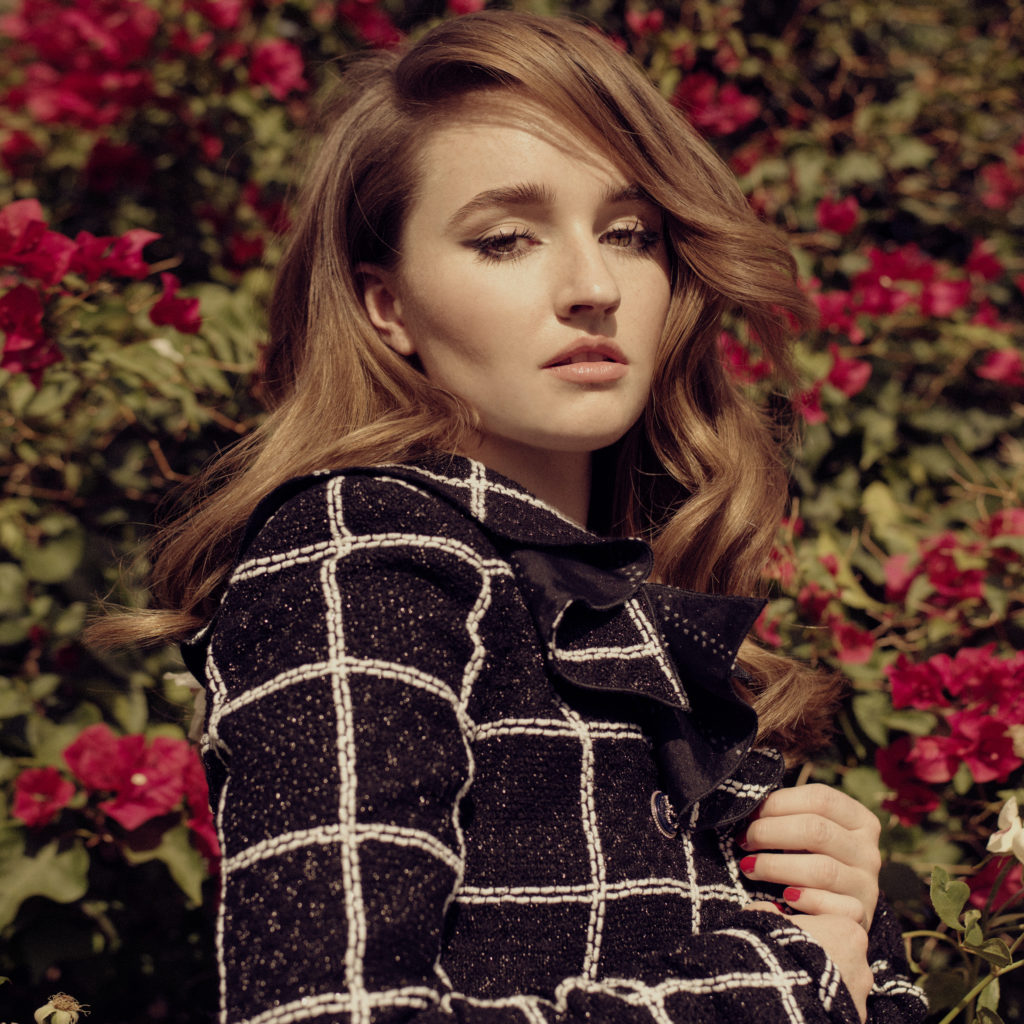KAITLYN DEVER
Interview by Laura Albert x JT LeRoy, Acclaimed icon and novelist
LA: Hi Kaitlyn, thank you so much for agreeing to do this. We know some people in common: Timothy Olyphant.
KD: Oh you know Timothy?
LA: I worked on Deadwood when it started. David Milch brought me in, in 2005 and ’06, when Timothy was just starting out. And thirteen years later he’s in the just completed Deadwood movie.
KD: That’s so cool, I love Timothy so much, he’s just the greatest.
LA: In an interview you described working with Timothy on Justified, how he would go to video village, make suggestions and things. He did not do that much in 2005, but after having done Justified and being within his character, that’s what he did on the Deadwood movie.
KD: Oh yeah, the cool thing about Timothy, it’s actually funny, because that was the first time – I was technically little, I was 12 actually when I started Justified– and it was the first time I had gotten to witness an actor lead the charge, sort of like set the tone. ‘Cause I know obviously that the director sets the tone on a set, but I learned since, being a lead for the first time on the set of Booksmart, we sort of knew: The way we were, the way we acted on set affected a lot of people. That was the first time, with Timothy, I got to witness that in my career, and it was really cool to get to see that level of involvement from an actor.
LA: Also, how Olyphant can get in and out of character, he can totally do a scene and then crack up. [Both laugh.]
KD: Oh yeah I love that about him, he’s really funny. He’s really funny in Once Upon A Time In Hollywood. He’s a really funny guy.
LA: One thing that strikes me is how very present you are. I’ve watched some interviews you’ve done, and you are phenomenally present even when someone’s coming at you, asking all kinds of bizarre stuff [Both laugh.], you’re present and respectful. That’s really hard to do.
KD: I just try my best to not think about what people may think. And when I’m doing interviews and all of the extra fun stuff that comes with being an actor and promoting the movie, I still get so nervous. I’m actually happy [Laughing.] that you saw that I was very present, because I do try my best to be in the moment as much as I can for all of that stuff. But it’s definitely not easy.
LA: I watched this interview where you’re walking in an airport, you have just come from DC where you advocated to Congress about reauthorizing the Debbie Smith Act, which concerns the outrageous rape-kit backlog. And there is TMZ coming at you and asking, Did you have any politician fans? Which celebrities are fans of Unbelievable? I was really impressed that you didn’t roll your eyes and say, “REALLY?!” [Both laugh.]
KD: Thank you, I appreciate that. That was a first-time TMZ moment for me. That was really a strange thing, I usually just go to the airport, I go to get my bags, then I go to my car and then that happened – the first time that ever happened. I was kind of like panicking inside, trying to keep my cool.
LA: Well you handled it really well. Unbelievable blew my mind, I’ve written a whole piece about it. Also, I know Brooke Smith-Lubensky who played the therapist that your character Marie goes to see.
KD: Oh you do, that’s amazing, I loved working with her.
LA: That was a beautifully played scene –her eyes conveying pure compassion, and Marie longing to trust but fearful she is dealing with yet another adult who cannot carry the weight of what Marie carries. How did you guys work that through?
KD: That day I was really nervous because I had all of this dialogue, we did all of the therapy scenes in one day. I remember it being nerve-racking and thinking about it before, then I got on the set and I met her, and we just started running the scenes. I believed that she was actually a therapist. [Both laugh.]
LA: Did you know of her before? Did you know about her work in The Silence of the Lambs?
KD: I had seen The Silence Of The Lambs and I do remember her from that, but I didn’t know she had been cast, and I was blown away by her. That was constantly happening on Unbelievable though, with stuff I was afraid of, stuff that scared me: When I got on the set, it actually completely surprised me in a lot of situations that were unexpected, but in a really good way. And that was one of those days, I was really calm. I felt we were making some really beautiful scenes, and I just trusted myself and Brooke. I think that’s a rarity, to show Marie forging a connection. With the Merritt Weaver and Toni Collette storyline, they were able to share their storyline together, and have that consistency. But I was sort of isolated in a way, because Marie was meeting new people in every scene. I guess it was helpful for my character development because that kind of isolation was what Marie was going through in her life.
LA: After Unbelievable, you’ve become a spokesperson for survivors of trauma and rape, but when you give interviews, they’ll zip into talking about fashion. How do you manage those transitions?
KD: It is very gratifying to be a part of Unbelievable. I feel really grateful to be given an opportunity to play Marie, and for the fact that now the show’s been seen by so many, and people have learned so much from it. I am overjoyed to know that I’m able to do what I really love, I have so much fun doing acting, it’s like my favorite thing in the world. But the fact I’m able to do that and do something good with it at the same time, which moves people in a bigger way… I want to continue to do that in the future! But in terms of juggling, talking about fashion, talking about Unbelievable and talking about Booksmart at the same time – both of them came out in the same year. It’s funny, when I do interviews they’ll always talk about Booksmart first and then they’ll say okay now to shift gears a little bit, and it is always a gear shift. But I like the gear shift. That is what makes me feel so alive and artistically stimulated. I paid attention to that kind of energy when I was shooting Unbelievable, the story is just so, so heartbreaking and terrible and horrifying, and I was focusing deeply. I was just always sad. My character was always sad but I was also just sad, I felt bad, I felt so, so bad for this person and what she had to go through, and that was constantly on my mind. But I also wanted to focus on the lighter moments when we were shooting. I think we see that in the ways she coped, that was a really important element to me. I read about her and studied the source material, she really had an on-off switch and that right there is what makes her so brave. And so I think, yeah the gear shift, and everything about that is just kind of everywhere for me, it’s in interviews and it’s also in my work, and I think it’s in life in general. I guess I’m able to treat both sides with equal amounts of respect.
LA: I’m interested in your process,when you’re living within a character, and the character is living within you. Can you tell us some of what’s going on in your head?
KD: I’ve talked to a lot of other actors, I love hearing people’s process, I love hearing what my actor peers do in audition rooms and how they feel on set. I have a lot of close friends and I’m able to talk about all of this with them, which is really helpful, and also nice and exciting. Some people are not nervous for an audition, but when they get on set, they freeze up and get really nervous. I’ve actually been the person who gets extremely nervous for auditions, because I’m so worried about getting it right. It’s the fear of the unknown, not knowing what they think, what they like. For me there’s a sense of comfort once I get on set, because I can take that pressure off and know, okay I was chosen for a reason, I trust that they trust me. I think it also has a lot to do with growing up – especially in my teen years. I had to deal with working and knowing at the same time my mom was actually diagnosed with stage 4 breast cancer, right around when I was doing Justified.
LA: I’m so sorry.
KD: Oh it’s okay, she’s doing good now. She’s the strongest woman I know! Dealing with that at such a young age, you gain so much perspective on what really matters in life. When I do scenes, especially silent scenes, which could be thought of as daunting scenes, to have to portray so many emotions within a short period of time, and you don’t have any dialogue. I’ve always just been able to live in the moment and not overthink it, and trust I know the character that I’m playing, I don’t hesitate, I go for it – and that’s when I think my work comes to life in an honest way. And I have noticed when I get way too in my head, when I’m thinking about the way my face looks or something. That has happened a couple of times, I don’t like that feeling. I have to just completely forget. I don’t ever think about what I look like, I don’t ever really know where the camera is or how tight they are, how tight of a shot they have, it’s whatever. I internalize a lot, I internalize everything.
LA: Can you talk about what it was like going to Congress about the Debbie Smith Act and making that presentation?
KD: Again, it feels so good just to finish a project, it’s unbelievable, knowing you’ve put in the work and everyone around you put in the work for a very important story. I knew it was going to be so valuable for the world to see it. I’ve been working for twelve years now, and you can love something so, so, so much, and nobody sees it. They check all the boxes in terms of what’s good, but no one sees it. So with everything now, I try to keep a realistic point of view. When Unbelievable was released, I had a lot of people reaching out to me, coming up to me in person, telling me about their stories. What more could I ask for as an actor than to be able to do that? For people to actually believe in my portrayal and find it to be truthful is the greatest honor. And going to Congress and walking around the capitol in Washington, D.C. – who, who’s that actor in here? [Laughing.] I had a pass and everything, it was blowing my mind, it was one of the coolest trips I’ve ever had in my life. It was extremely moving to be able to do that. This is just a side note, but we were talking to members of Congress all day, and then in the evening we had a screening and a discussion afterwards. The screening took place where the Kavanaugh hearings were held. Our screening was in that room. It was really surreal.
LA: That’s good though. We are going to overwrite that energy! [Both laugh.]
KD: I know! We’re taking over! [Laughing.] It was one of the coolest trips I’ve ever had. I learned so much. I thought I had learned a boatload, gained so much knowledge on trauma already and how it affects people differently, and how a sexual assault case is handled. I thought I had learned so much doing the project, but I’m still learning every day from people I talk to, or doing things like going to Congress in support of the Debbie Smith Act, it’s just so great.
LA: How did the invitation come?
KD: I think the creators of Netflix wanted to make the trip happen because they knew the Debbie Smith Act was about to expire, they wanted to get down there and at least screen Unbelievable and talk about it. That’s how it came about.
LA: Again, I am struck by how very present you are, onscreen but also in person. That can be really difficult to navigate, but it seems like you have the tools to handle it.
KD: I have so much respect for people who come up to me and feel able to discuss their stories with me – and it’s so hard, I have so much respect. No one should ever, ever, ever have to go through something like that. I feel like I owe everything to talking about Unbelievable and using my craft to also have a positive impact, – and maybe at least allow people to feel seen and heard. That’s something I’ve learned as I’ve gotten older, I can actually choose projects that do that for people. And it is very fulfilling to be a part of a project like that. I’ve witnessed that with Booksmart and Unbelievable – those two projects and the effect they had on people. It’s been really eye-opening for me in terms of what I want to do with my work, what I can and what I’m able to do with my work and the projects I am part of.
LA: I loved Booksmart and how you threw yourself into your character. You are so very different – Amy says things that you might never say – but there’s no trace of embarrassment or shame. And that frees other young women to say and discuss things that woman are conditioned not to bring up.
KD: Yeah it is difficult, but I’ve always loved when it completely takes me out of my comfort zone. I don’t have the feeling that often, but sometimes I’ll get into a scene and be like, Oh God, really? But I know when I’m holding back, I’m very aware of it. I’ve also been conscious of that when I see performances in films. And I know that, in order to see what I want to see in movies, I have to do what I want to see in movies. Sometimes it’s awkward, sometimes I’m afraid, especially when it’s something Kaitlyn wouldn’t do in real life. But if people are watching the movie and they’re going to have fun watching it, or it’ll make them cry or laugh or whatever the emotional reaction might be, then I feel like it’s worth it. I am hired to do a movie, why would I do it halfway? That’s always my mentality going into it. It’s so hard to get work, I feel so lucky when I have an opportunity, I’m constantly trying to take it and go for it.
LA: Another person we have in common is Billie Lourd– I knew her when she was eleven. She was so fantastic in Booksmart, it’s a small role but she is transcendent. She is such a guide. She knows what she’s doing.
KD: Oh yeah she was such a guiding light, Billie Lourd, she’s really just the best. I could go on and on about Billie. I love her.
LA: Old soul, just really wise old soul.
KD: Yeah, yeah, yeah.
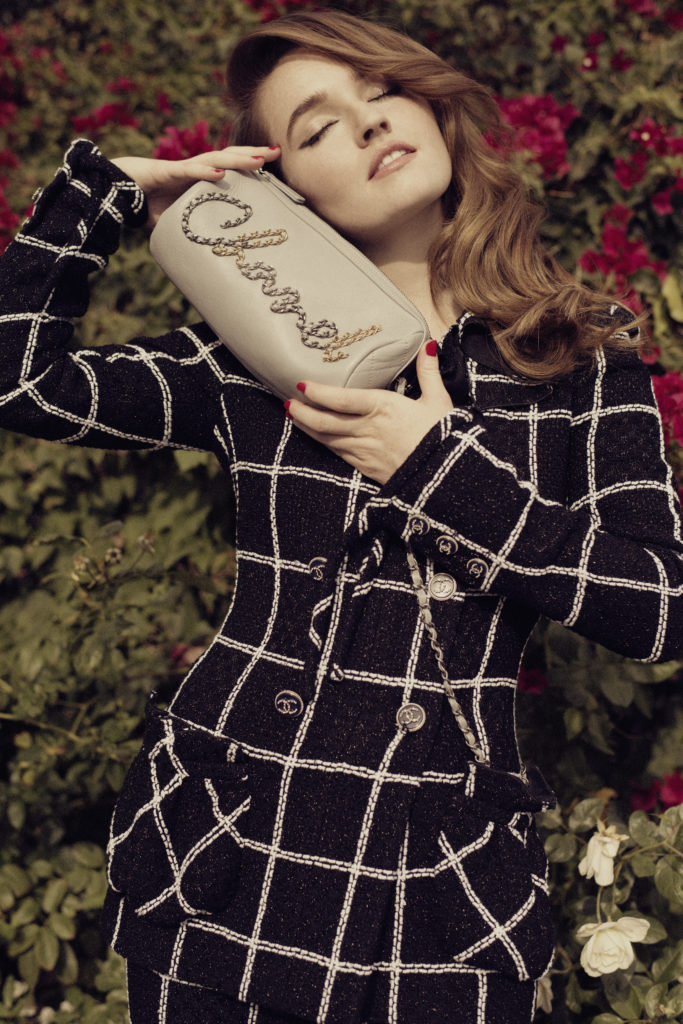
Jacket and bag: CHANEL
LA: What are you reading? What kind of books do you like to read?
KC: I just finished reading Many Lives, Many Masters, which is actually a really cool book about past lives. I’m not sure if I believe, but it’s a really interesting book. And I’m about to read The Catcher in the Rye.
LA: You’ll definitely dig that. The smartest actors I’ve encountered, what they have in common is that they all read. Thank you so much, this was a lovely conversation.
KD: Thank you so much. Thank you for this conversation.
Interview by Laura Albert X JT LeRoy, acclaimed icon and novelist
Interview transcribed by Fotis Tzanakis
Creative Director & Shoot Producer: Deborah Ferguson
Makeup: Jenna Kristina using Chanel Beauty @ The Wall Group
Hair: Chad Wood @ The Wall Group
Manicure: Eri Ishizu @ Opus Beauty using Zoya
Layout: Allie King
All Clothing and accessories by ![]() CHANEL
CHANEL
See the trailers for Unbelievable and Booksmart here.

Blouse, purse, and earrings: CHANEL

